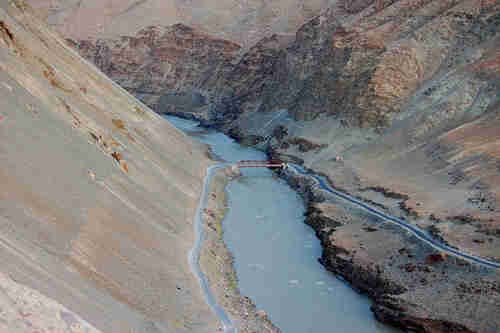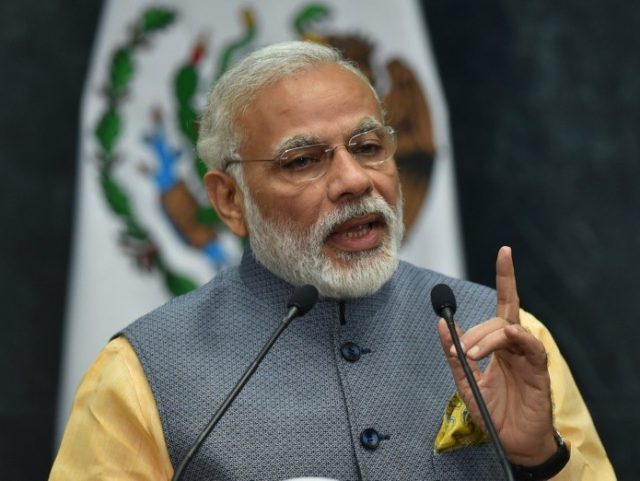This morning’s key headlines from GenerationalDynamics.com
- India’s Narendra Modi threatens to divert water from Pakistan to India’s farmers
- Dangerous tensions continue in Kashmir
- India says that Modi’s ‘demonetization’ program reduced Kashmir violence
India’s Narendra Modi threatens to divert water from Pakistan to India’s farmers

Indus River Valley (Reuters)
As tit-for-tat charges and insults between India and Pakistan continue to escalate, India’s prime minister Narendra Modi on Wednesday said that India would abrogate the 56-year-old Indus Water Treaty and divert water currently flowing from India to Pakistan back to India’s farmers.
Speaking to a rally in Punjab last week on Friday, Modi said:
Under the Indus Water Treaty, India has the right over water of Satluj, Beas and Ravi rivers. It rightfully belongs to our farmers, but this water is not reaching the farmer’s field, instead the water is flowing to Pakistan and eventually going to the sea. Governments came and went in Delhi, but farmers kept suffering as water continued to flow to Pakistan. Not any-more, I will ensure that farmers get what is rightfully theirs.
This water is neither being utilized by Pakistan nor does it come in Indian farmers destiny. I have set-up a task force. I’m committed to ensure that every single drop of water, which is rightfully ours, under the Indus Water Treaty, is brought to the farmers in Punjab, Jammu and Kashmir, and other parts of the country…
There is no reason that we cannot use our rights (over our waters) and let our farmers suffer. I need your blessings in order to fulfill your requirements for watering your fields.
Sirajul Haq of the Islamist political party Jamaat-i-Islami responded:
Yesterday, prime minister of India Narendra Modi sent a message to Pakistan that he would block our rivers. Today, standing here in Karachi, near the mausoleum of Quaid-i-Azam Mohammad Ali Jinnah I want to inform Modi that the line does not exist on his palm that says that he can do any such thing. Mr Modi, if you stop our water, we will stop your breathing.
Pakistan officials so far has been relatively restrained in responding to this threat, possibly viewing Modi’s remarks as merely campaign rhetoric. They pointed out that the Indus Water Treaty was mediated by the World Bank in 1960, and has survived despite several wars between the two sides. Pakistan media reports have pointed out that Pakistan is already short of water, and that Modi’s threat, if implemented, would deal a severe blow to Pakistan’s farmers. The News (Pakistan) and Hindustan Times (11-Nov) and Pak Observer and Dawn (Pakistan)
Related Articles
Dangerous tensions continue in Kashmir
Pakistan and India abandoned any pretense at cordial relations earlier this year after a January 2 there was a terrorist attack on an Indian air force base in Panthankot, Punjab, which India blamed on Pakistan. Pakistan accused India of staging the attack to defame Pakistan.
The name-calling became extremely vitriolic after a September 18 terrorist attack on India’s Uri army base in Kashmir. Four militants, carrying guns and grenades, stormed an Indian army base in Uri in Kashmir. There was a five-hour firefight, and at least 17 soldiers were killed, as were the militants. This was the worst militant terrorist attack in Kashmir in years.
This comes as the violence in Kashmir continues to increase. In October, India relocated 10,000 people in India-controlled Kashmir away from the Line of Control (LoC) that separates the India and Pakistan regions of Kashmir, and last month Pakistan evacuated 8,000 people from Pakistan-controlled Kashmir away from the LoC. CNN (1-Oct) and CNN (16-Nov)
Related Articles
- New terrorist attack in Kashmir threatens India-Pakistan retaliation (19-Sep-2016)
- India and Pakistan in vitriolic accusations at the UN over Kashmir and Balochistan (18-Sep-2016)
India says that Modi’s ‘demonetization’ program reduced Kashmir violence
On November 8, India’s prime minister declared 500-1000 rupee notes worthless. This “demonetization” policy has, in many ways, been an economic disaster, causing hardship for many people who have been standing in lines at banks for hours at a time just to exchange the worthless notes for new notes. Many people have been unable to buy necessities like food, and some have been stranded far from home, unable to purchase train tickets.
According to India’s defense minister Manohar Parrikar, the demonetization program has substantially reduced the amount of violence in Kashmir, by reducing incidents of stone-pelting. According to Parrikar:
Earlier, there were rates: Rs 500 for stone pelting [on security forces in Kashmir] and Rs 1,000 for doing something else. PM has brought terror funding to zero. In the last few days after PM’s daring move there hasn’t been stone pelting on security forces. I congratulate PM for it.
It’s believed that separatist activists were paying stone-pelters in counterfeit notes that had been printed in Pakistan. By making all 500-1000 rupee notes worthless, the counterfeit notes also became worthless.
If all this is true, then it would certainly count as a fairly spectacular success story, even if the reduction in stone-pelting only lasts a few months. From the point of view of Generational Dynamics, the violence in Kashmir is “organic” or “indigenous,” in the sense that it’s not directed by armies or generals, but is rising up from the people. The violence comes from various tribal and ethnic groups, not from an army or militia obeying the orders of a national commander.
As I described in a recent article, India’s last two generational crisis wars were India’s 1857 Rebellion, which pitted India’s Hindus against the British colonialists, and the 1947 Partition war, which pitted Hindus and Muslims against each other, following the partitioning of the Indian subcontinent into India and Pakistan. As we described in that article, the 1857 war led naturally to violence between Hindus and Muslims decades later, and then to the 1947 war.
Now we’re seeing that the 1947 war is leading, decades later, to new violence between Hindus and Muslims. Generational Dynamics predicts that we’re seeing a kind of repeat of 1947, and that this increasing violence will lead to a new generational crisis war between Hindus and Muslims, and from there to full-scale war between Pakistan and India.
If Modi’s demonetization program is really reducing the amount of stone-pelting, then it’s a development that can almost be described as amazing. But from the point of view of Generational Dynamics, it’s only temporary, in that can’t stop the generational changes that are leading to a major new war between Pakistan and India. Times of India and Business Standard (India)
Related Articles
- India’s prime minister Narendra Modi declares 500-1000 rupee notes worthless (12-Nov-2016)
- India’s Narendra Modi finally hits out at Cow Protectors (‘Gau Rakshaks’) (07-Aug-2016)
KEYS: Generational Dynamics, India, Narendra Modi, demonetization, Kashmir, Pakistan, Sirajul Haq, Jamaat-i-Islami, Indus Water Treaty, World Bank, Panthankot, Uri, Manohar Parrikar
Permanent web link to this article
Receive daily World View columns by e-mail

COMMENTS
Please let us know if you're having issues with commenting.